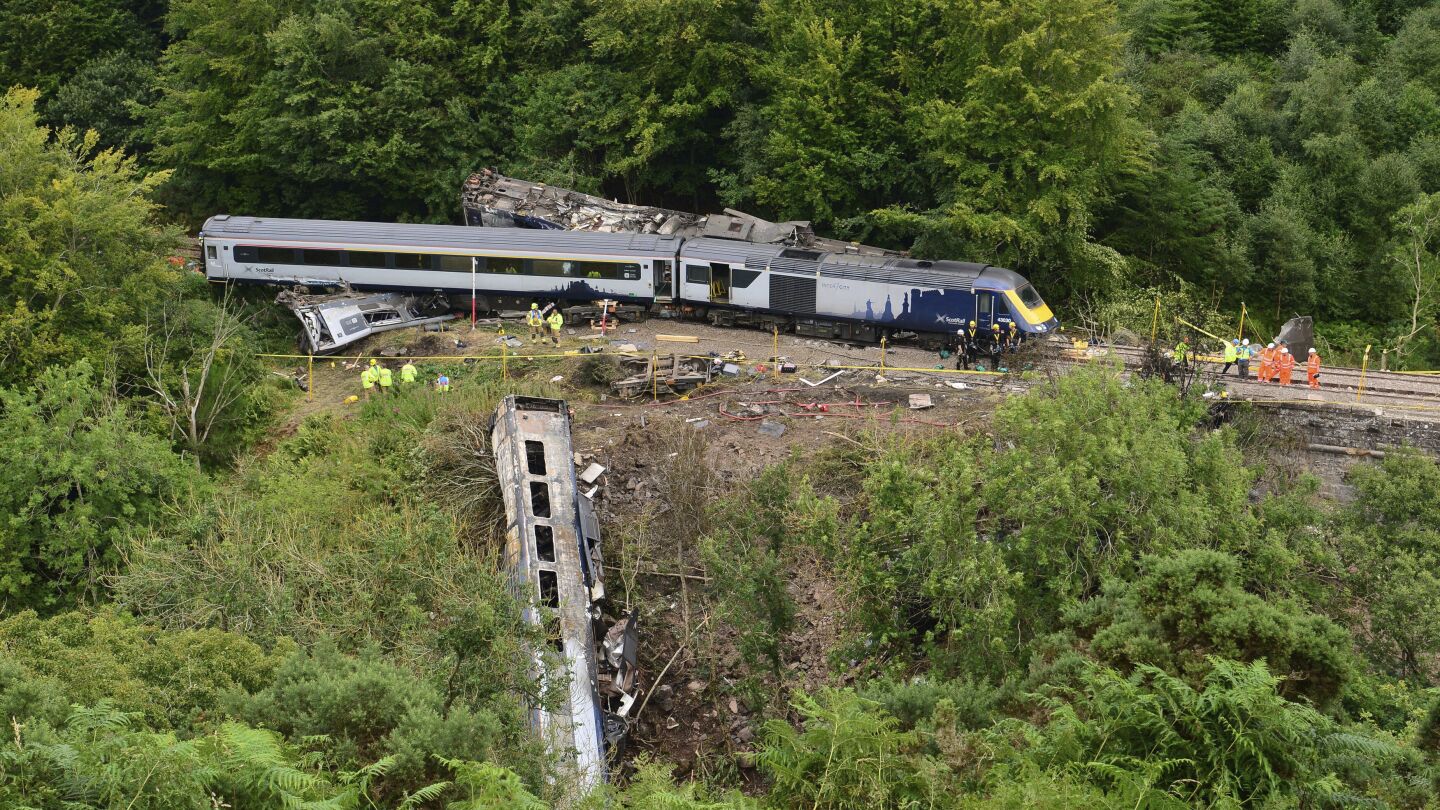LONDON (AP) — A British rail operator pleaded guilty Thursday to safety failures that led to a train derailment that killed three people and injured six others three years ago in Scotland.
Network Rail admitted in High Court in Aberdeen, Scotland, that it failed to ensure the safety of passengers and rail workers before extreme rainfall unleashed a slide that buried the tracks in rocks and gravel and caused the train to derail and topple down a hill.
Train driver Brett McCullough, 45, conductor Donald Dinnie, 58, and passenger Christopher Stuchbury, 62, were killed in the Aug. 12, 2020 crash near the coastal town of Stonehaven.
Stuchbury, who died on his wedding anniversary, wasn’t supposed to be on that train but had boarded it in hopes of making a transfer down the line after his original train headed toward Edinburgh was canceled because of severe weather.
“He had one last trip before retirement,” his widow, Diane, said in a statement read in court by a prosecutor. “On that day in 2020, our lives were ripped apart. He and I have been robbed of a future together as a family.”
Network Rail, which is government-owned and responsible for the U.K.’s train tracks, admitted it failed to properly inspect the drainage that washed onto the tracks and did not take precautions to slow trains in severe weather.
The train had been bound from Aberdeen to Glasgow but was turned back because nearly a month’s worth of rain had fallen in three hours.
McCullough, who was driving just below the posted speed of 75 mph (120 kph), had asked a signaler if he needed to slow down because of the torrential rain but was told, “Eh no, everything’s fine between myself and Stonehaven,” Prosecutor Alex Prentice said.
When McCullough pulled the emergency brake, it was too late to stop.
The ScotRail train hit the gravel, went off the tracks and struck a bridge guardrail, causing the engine and one of four carriages to plunge down an embankment.
A 32-year-old woman passenger who was scarred and disfigured after being tossed across the carriage and ejected out a window told the court that she realized there was a problem when it suddenly felt “weird” as if the train was floating or sliding like when a car aquaplanes.
“There was a strange noise like metal dragging along metal,” she said. “I will never forget that noise.”
She said she was knocked unconscious for about 15 to 20 minutes and was in pain when she came to on the side of the railway. Her face was covered in blood and it felt like a bone was sticking out of her left shoulder.
“The carriage directly behind me was laying across the rail track, crushed under another carriage. I later found out that the crushed carriage was the one that I had been ejected from,” she said. “I don’t know why I survived. But I feel lucky every day that I did.”
She said her life has totally changed, she’s fearful and no longer trusts the rail operator. She said her mother had to accompany her to work the first time she took a train after the crash.
“The train derailment was not an accident. It was the result of Network Rail’s absolute negligence,” she said. “Network Rail failed me and everyone else on the train that day.”
A spokesperson for Network Rail said in a statement that the derailment “was a terrible day for our railway and our thoughts remain with their families and all those affected by the accident.” It said it learned lessons from the crash and has worked to make its railway safer since.
Dinnie’s long-term partner, Trish Ewen, said his death had upended her life.
When she heard about the derailment, she had a gut feeling it was the train Dinnie was working on. But she expected the conductor to be fine and helping other passengers.
“We heard the driver died and that’s when my stomach started turning and I feared the worst,” Ewen said. “I felt dizzy. Like the blood drained from my head. My hands and arms felt heavy and shaky and almost disconnected from the rest of my body. I was just in a daze.”
Dinnie had been helpful and reassuring to passengers concerned that the weather would further alter their plans or stop the train, the 32-year-old woman survivor said. She said he had joked that the storm would allow him to finish early and he was excited to get home.
Just that morning, he and Ewen had been making plans over breakfast about what to do after work, she said.
“I couldn’t understand how things went from that to this,” Ewen said. “I couldn’t understand how Donald was here, then gone. I couldn’t comprehend how our life together went from normal to over. Just like that.”

